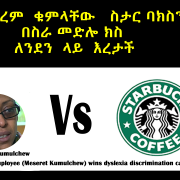Starbucks employee wins dyslexia discrimination case
A woman with dyslexia has won a disability discrimination case against her employer Starbucks after she was accused of falsifying documents.
A tribunal found Meseret Kumulchew had been discriminated against after making mistakes due to her difficulties with reading, writing and telling the time.
She was given lesser duties at her branch in London and told to retrain, which left her feeling suicidal.
Starbucks said it was in discussions about providing more workplace support.
The judgement against Starbucks was made in mid-December, and there will now be a separate hearing to determine any compensation.
As a supervisor at Starbucks at Clapham Junction, in south-west London, Ms Kumulchew was responsible for taking the temperature of fridges and water at specific times and entering the results in a duty roster.
She was accused of falsifying the documents after mistakenly entering wrong information.
'Not a fraud'
She took Starbucks to an employment tribunal alleging disability discrimination saying she had always made it known to her employer that she was dyslexic, which means she has difficulties with words and numbers, and has to be shown how to do tasks visually.
The case does not set a legal precedent, but the British Dyslexia Association said it should be a wake-up call for employers.
It estimates that one in 10 people has dyslexia to some degree, although many have not been formally diagnosed.
Speaking exclusively to the BBC, Ms Kumulchew said: "I am not a fraud. The name fraud itself shouldn't exist for me.
"It's quite serious. I nearly ended my life. But I had to think of my kids. I know I'm not a fraud. I just made a mistake."
The tribunal found Starbucks had failed to make reasonable adjustments for Ms Kumulchew's disability and had discriminated against her because of the effects of her dyslexia.
It also found she had been victimised by her employer and there appeared to be little or no knowledge or understanding of equality issues.
'Anxiety'
In a statement, Starbucks said: "We are in ongoing discussions with this Starbucks partner (employee) around specific workplace support and we are not able to comment on a case that has not yet been completed."
The company said it was committed to having a "diverse and inclusive workforce" that "feel welcome and comfortable in our stores".
Ms Kumulchew said she wanted help - for example, more time to fully understand and become familiar with a task, and someone to check her work for mistakes.
"I'll struggle, but don't worry, help me and I'll get there in my own time," she continued.
"I'm not going to affect your business, because for every customer I'll roll out the red carpet.
"I love my job. Giving them a coffee may not be a big deal, but I'm making their life, for the day at least, happy."
Dr Kate Saunders, CEO of the British Dyslexia Association, said: "Many dyslexics are struggling in the work place with very high levels of anxiety, because employers do not have the training or the awareness to make adjustments for them."
What is dyslexia?
- Dyslexia is a common learning difficulty that can cause problems with reading, writing and spelling
- Signs of dyslexia usually become apparent when a child starts school and begins to focus more on learning how to read and write
- A person with dyslexia may: read and write very slowly, confuse the order of letters in words, have difficulty taking notes or copying and find it hard to carry out a sequence of directions
- People with dyslexia often have good skills in other areas, such as creative thinking and problem solving
- Reasonable adjustments for dyslexics might include making sure an employee has a recording device for meetings, providing support with proof reading and giving instructions verbally rather than in writing








